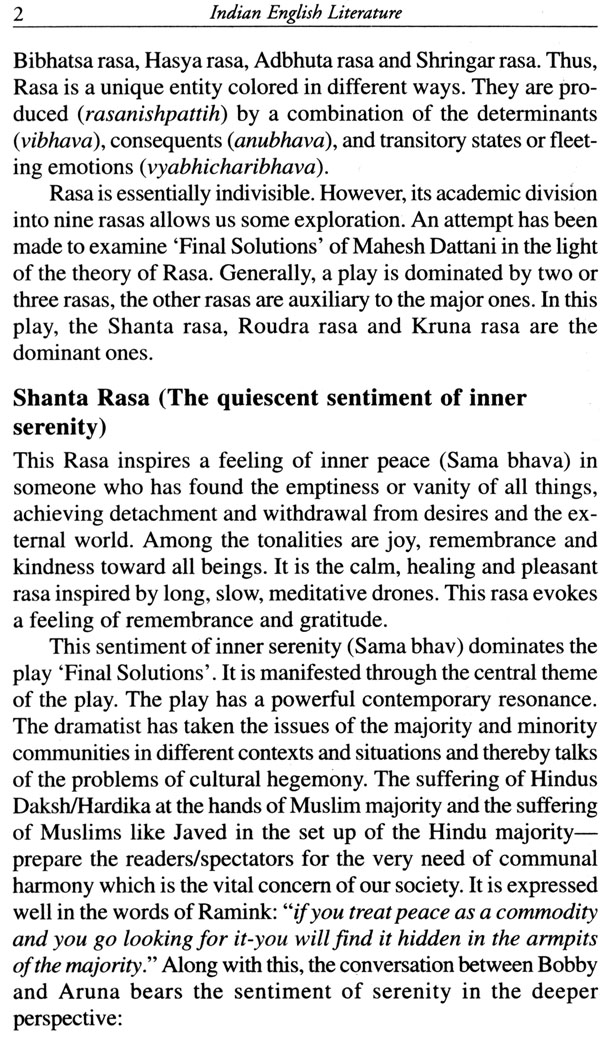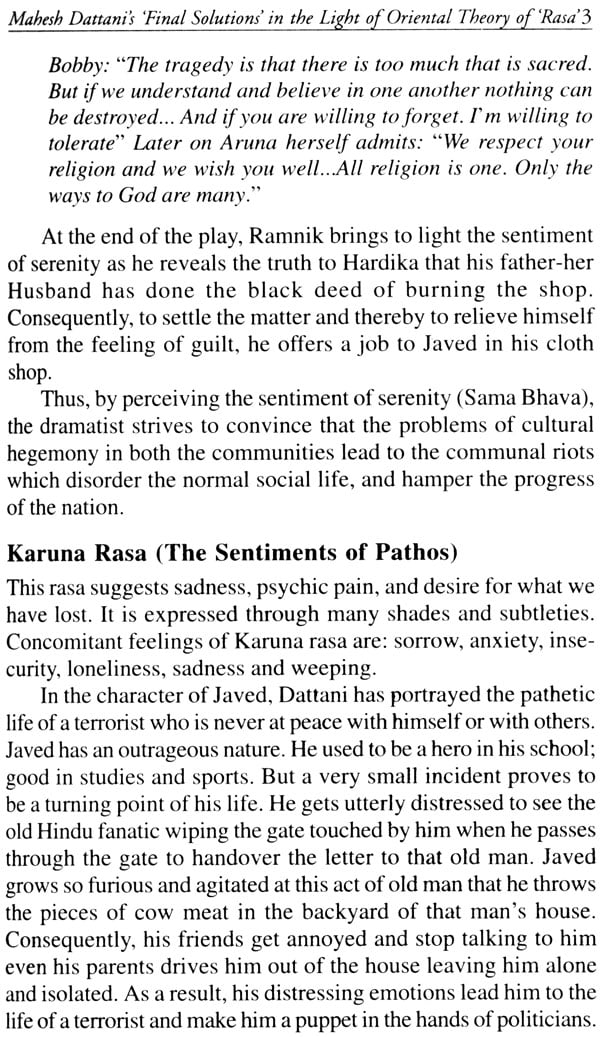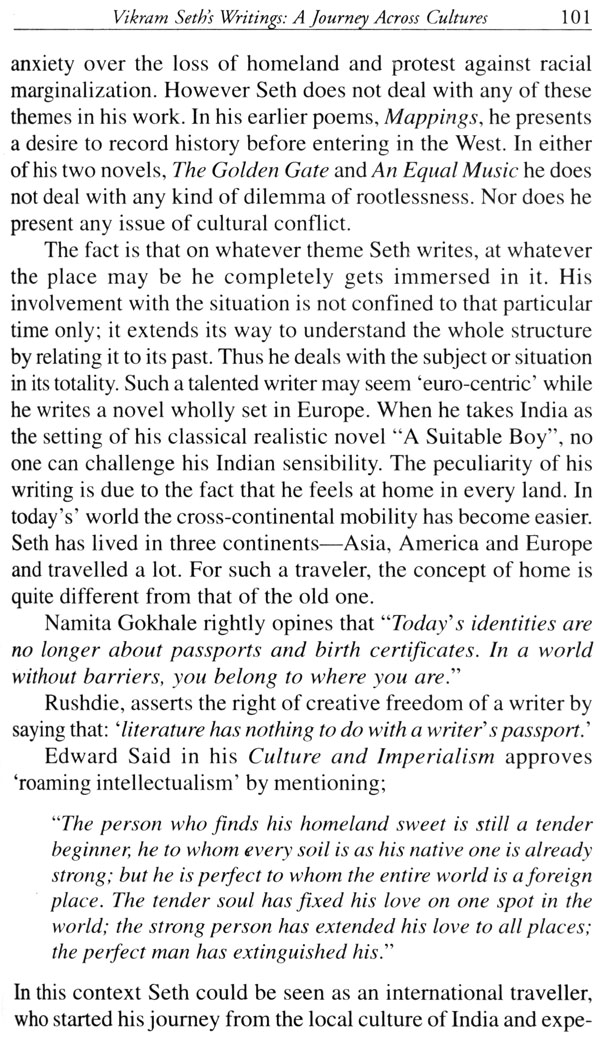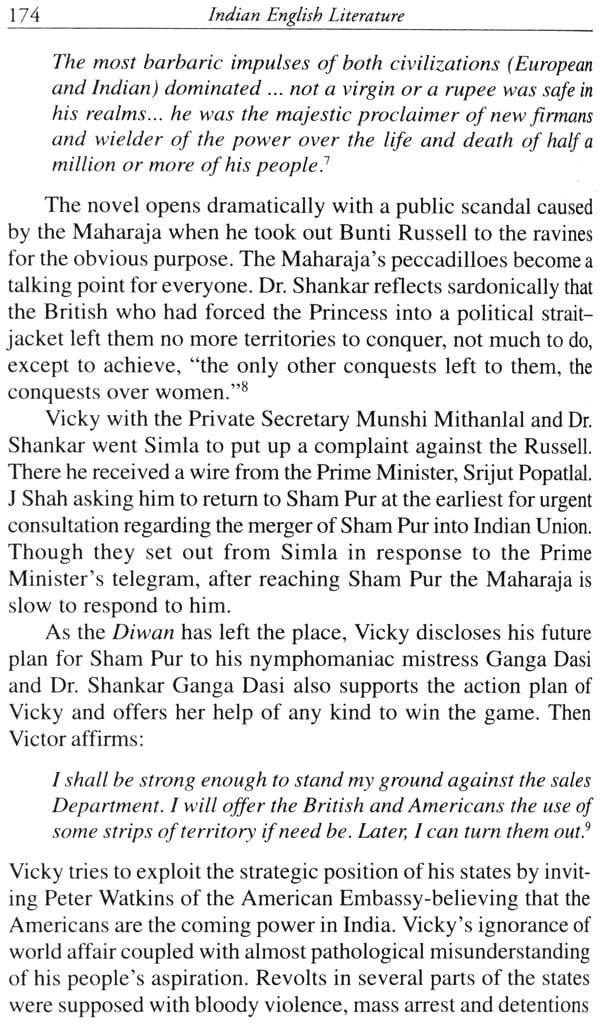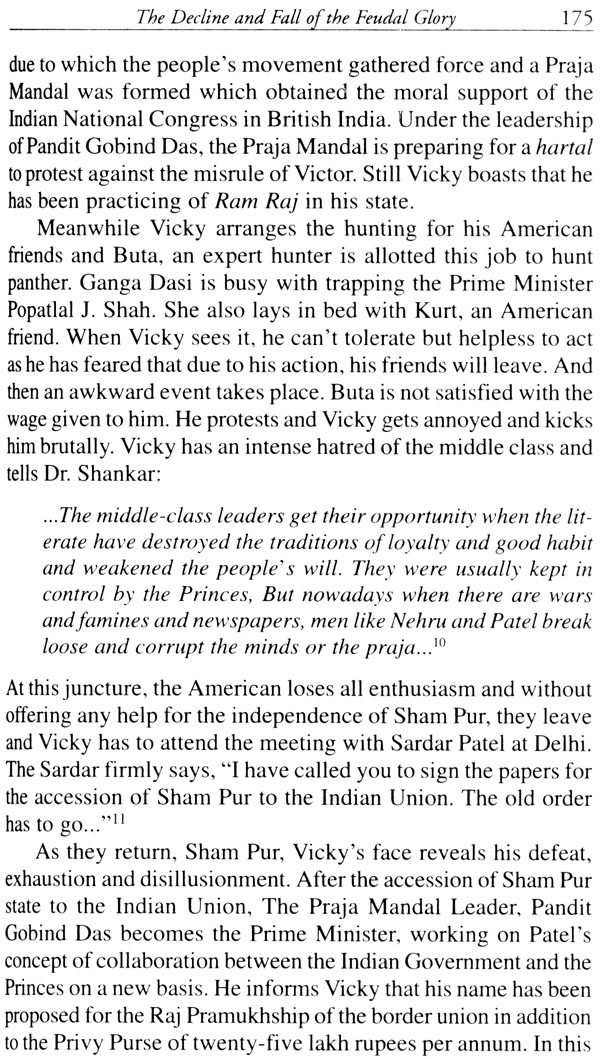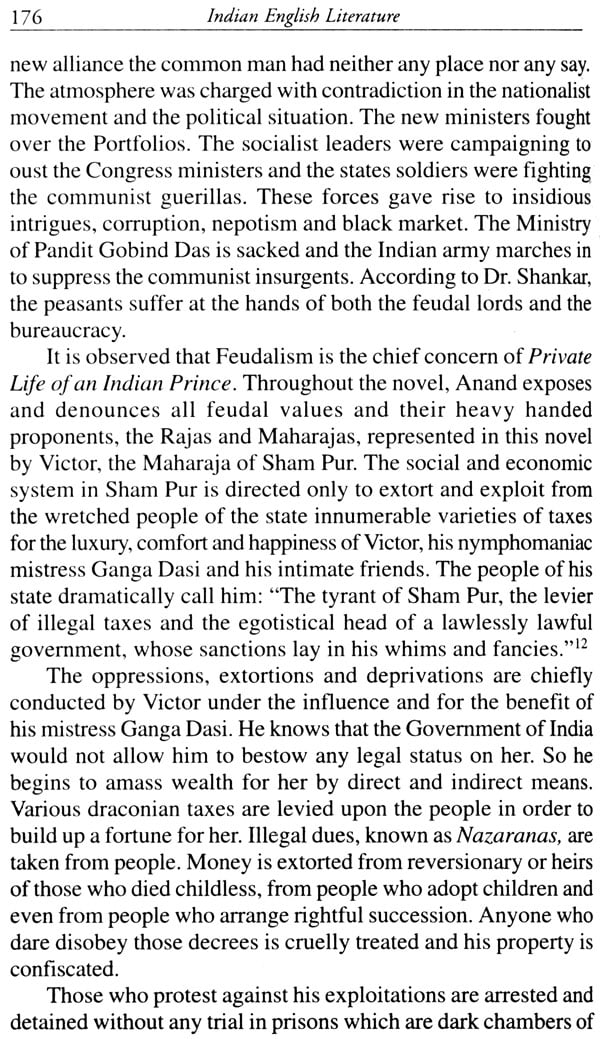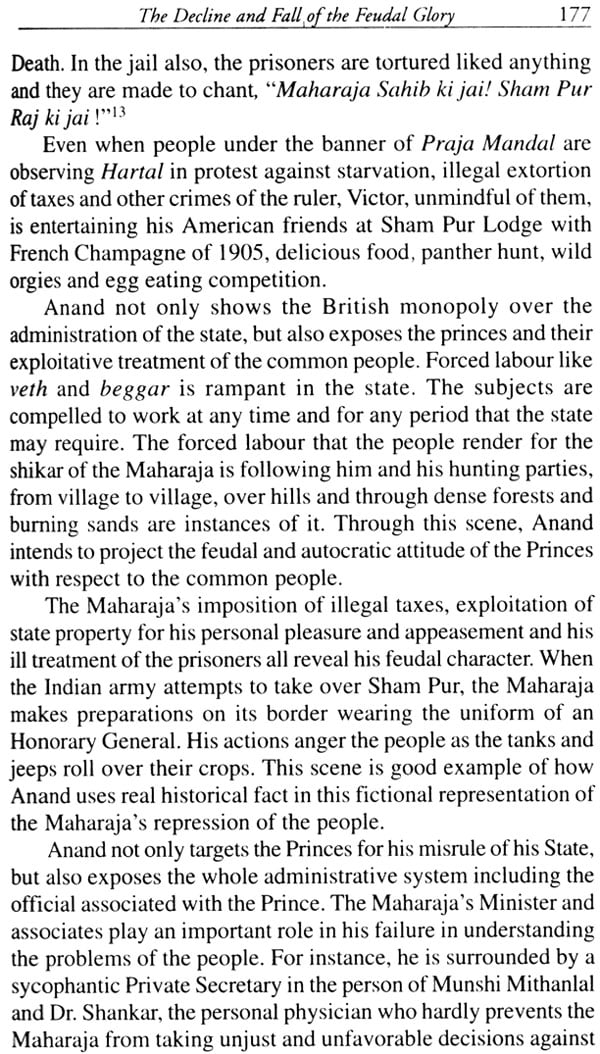
Indian English Literature (Contemporary Perspectives)
Book Specification
| Item Code: | NAI238 |
| Author: | Dr. Santoshkumar G. Chauhan |
| Publisher: | Standard Publishers India |
| Language: | English |
| Edition: | 2013 |
| ISBN: | 9788187471769 |
| Pages: | 350 |
| Cover: | Hardcover |
| Other Details | 9.0 inch x 5.0 inch |
| Weight | 590 gm |
Book Description
The present anthology aims to probe, discuss and scrutinize the ways in which Indian writers have dealt with different social, political and psychological issue in their writings. It also extensively covers the Indian sensibility as manifested in the works of many eminent writers. It is a humble attempt to fill the dearth of comprehensive critical studies from multiple perspectives. This volume does not claim to be highly comprehensive in analyzing Indian sensibility through different perspectives, taking into the consideration it’s immensely rich cultural and social heritage. But it is expected that it will be an indispensable source for students and teachers of Indian writing in English and will enable the readers to grasp the real scenario of the contemporary Indian literature in English.
Dr. Santoshkumar G. Chauhan has been serving as the principle of the one of the most prestigious colleges of Arts at Palanpur and has been teaching under graduate and post graduate students of English Literature for last two decades at the same college. He has been the senate member of the concerned university court, member of the Board of studies in English and a member of the faculty of Arts. He is also the president of English Teachers Association (EAT) of the faculty of English teachers of all the colleges of the concerned university.
Dr. Santoshkumar G. Chauhan has participated and presented various research papers at National and International seminars and Conferences which have been published in various periodicals and Journals of repute and credited with the publication of a very important book on the plays of living legend Caryl Charchill, on British feminist theatre.
He has been a Ph.D. Guide in many prestigious universities of India and has supervised many M. Phil students and at present some scholars are already working with him for their Ph.D. dissertation.
It has indeed been a pleasure to edit this work ‘Indian English Literature: Contemporary Perspectives’. This anthology is a collection of papers, presented in the ‘National Seminar’ organised by our college. It is a humble attempt to disseminate the knowledge shared with us. The papers vary from the general scenario of the Indian English Literature to the analysis of the work of individual authors. Indian English literature has been an area of special interest for scholars as well as researchers as we can easily identify with the issues and challenges faced by us.
This is book comprises of scholarly research papers of many scholars of Gujarat as well as the entire nation to clear our perception of the contemporary trends observed in the field of Indian Writing in English.
Anila Pillai, in her paper, ‘Neutralizing the Neutered: Seven steps Around the Fire’ analyses the predicament of the subaltern. It explores the hidden sensibilities of the marginalized.
Dr. Sudh R. Menon ‘Female Empowerment through Nurturance and Sisterhood: A Reading of Usha Ganguli’s ‘Rudali’ studies Usha Ganguli’s Hindi play ‘Rudali’ translated into English by Anjum Katyal as a text which celebrates female empowerment through nurturance and sisterhood.
Ankita Shah, in her paper ‘Fiction and Film’ correlates these two branches of arts. She substantiates her paper through rendition of ‘Five Point Someone’, in ‘Three Idiots’.
Ashok kumar Yadav’s paper ‘Mahesh Dattani’s Tara: A Social Play’ analysis gender discrimination in our society through Mahesh Datani’s ‘Tara’. He portrays Dattani as the true champion of the subalterns.
Dr. Beena Agarwal in her paper ‘New Frontiers of Indian English Literature—Direction and Dimensions’ throws light on the contemporary Indian English Literature and asserts that it has a fertile soil admitting the influence of diverse socio-cultural conditions.
Iliyas mansuri in his paper ‘Praveen Gadhvi’s ‘The voice of the Last: Presentation/Representation of ‘the Other” through self-transcendence’ remains us of an age-old history of segregation, exploitation and discrimination of Dalits.
Parag Shukla’s paper ‘From Fiction to Film: With Special Reference to R.K. Narayan’s ‘The Guide’ and ‘Malgudi Days” deals with the issues and challenges of the rendition of the fiction.
Dr. Jogeshkumar M. Purohit’s ‘The Plight of Traditional Hindu House Wife: the Central Theme of R.K. Narayan’s the Dark Room’ is designed to analyses R.K. Narayan’s novel The Dark Room from the feminist point of view. The Dark Room (1938) is a sociological study of an Indian household, which demonstrates the typical Indian attitude of life.
Bhagvanbhai H. Chaudhari’s ‘Postcolonical Perspectives in the Novels of R.K. Narayan’ deals with rural locale, language and customs in the works of R.K. Narayan in which we find post colonial discourse.
. Prof. Jagruti Patel’s ‘In the Country of Deceit—A Leap Towards Modernity’ by Shashi Deshpande explores the expression of an independent woman openly accepting her basic need for love and sex.
Prof. Tarun Raval’s ‘Changing Image of Woman in Indian Literature’. This paper presents a critical study of transition and transformation of the fair sex in Indian Literature. The survey begins with Bankim Chandra Chatterjee’s Rajmohan’s Wife (1864), and discusses various evolutionary aspects of Indian women in fiction of eminent Indian writers like K. Satthinandan, Sorabji Cornelia, A. Subramanya, Kamala Markandya, Bhabani Bhattacharya, Anita Desai, and Chetan Bhagat and so on.
We are grateful to all the contributors from the various parts of the country, without whom this book would have not seen the light of the day. We are thankful to Standard Publishers (India), New Delhi for their faith in our editorship.
| Preface | ix |
| 1. A Critique of Mahesh Dattani's 'Final Solutions' in the Light of Oriental Theory of 'Rasa' | 1 |
| Kamal Dave | |
| 2. Female Empowerment through Nurturance and Sisterhood: A Reading of Usha Ganguli's 'Rudali' | 11 |
| Dr. Sudha R. Menon | |
| 3. New Frontiers of Indian English Literature: Directions and Dimensions | 16 |
| Dr. Beena Agarwal | |
| 4. Touchable Tales of Untouchables: A Study of Gujarati Dalit Short Stories in English Translation | 31 |
| Vasant K. Joshi | |
| 5. Inverting the Patriarchal Structure: An Analysis of Mahesh Dattani's Where There is a Will | 41 |
| Dr. Arti S. Khindri | |
| 6. Women's Voice in Indian English Drama: A reading of kusum Kumar's Listen Shefali and | 50 |
| Mahasweta Devi's 'Mother of 1084' | |
| Varsha Vanza | |
| 7. Praveen Gadhvi's The Voice of the Last: Presentation/Representation of 'the other' through | 63 |
| self-transcendence | |
| lliyas Mansuri | |
| 8. The White Tiger: A Critique | 74 |
| Premnath N. Mishra | |
| 9. Expolring Mutiple Layers of Marginality: A Post-Colonial Analysis of Mahesh Dattani's Radio | 85 |
| Plays Seven Steps Around the Fire and The Swami and Winston | |
| Dr. Bipin R. Parmar | |
| 10. Vikram Seth's Writings: A Journey Across Cultures | 98 |
| Manisha F. Shah | |
| 11. Literary Discourse in Train to Pakistan and its Screen Adaption | 106 |
| Dr. Firoz Sheikh | |
| 12. Fiction and Film | 115 |
| Ankita Shah | |
| 13. Women Portrayals of Ruskin Bond: Reflection of his Power of Observation and Imagination | 122 |
| Manish D. Bhatt | |
| 14.Reaching the Sky Heights, Feminism in the Contemporary Indian English Poetry | 130 |
| Bhadauria Manish Kumar Kishan Singh | |
| 15. Mahesh Dattani's Seven Steps Around the Fire: The Plight of Subalterns | 142 |
| Rishi Thakur | |
| 16. Aurobindo Ghosh's Savitri as an anti-Thesis to Elaine Showalter's Feminist Theory | 150 |
| Chetan Trivedi | |
| 17. Jaishree Misra: An Author of Secret with Special Reference to A Scandalous Secret | 157 |
| Rajesh Patel | |
| 18. Finding Out One's Roots in Unaccustomed Earth: An Analysis of Jhumpa Lahiri's Short | 163 |
| Stories "Mr. Sen's", "When Mr. Pirzada Came to Dine", "Unaccustomed Earth", and "Hell-Heaven" | |
| Ms. Dolon Ray | |
| 19. The Decline and Fall of the Feudal Glory in The Private Life of An Indian Prince by Mulk | 171 |
| Raj Anand | |
| Sanjay Bhut and Nilesh Joshi | |
| 20. Assertion of Individuality in Storm in Chandigarh | 180 |
| Dr. Nanda M. Jadeja | |
| 21. Diasporic Crisis of Culture and Identity in Jhumpa Lahiri's The Namesake | 186 |
| Vijay Patel | |
| 22. Anandmath: A Critical Study | 193 |
| Dr. H.L. Dave | |
| 23. Neutralizing the Neutered: Seven Steps Around the Fire | 202 |
| Anila A. Pillai | |
| 24. Rabindranath Tagore's Philosophy in 'Gitanjali': its Relevance Today | 211 |
| Mamta Buch | |
| 25. Historical Insight in Fictions of Manohar Malgonkar | 220 |
| Dr. Shruti Kikani | |
| 26. Emerging Trends in Indian Drama: An Overview | 227 |
| Paresh M. Bambhaniya and Purvi N. Gajera | |
| 27. Translations of Meghani's Works Based on the Folk Literature of Kathiyawad | 235 |
| Dr. J.K. Khuman and Prof. M.M. Raval | |
| 28. Love and/versus Marriage in Girish Karnad's Nagamandala | 243 |
| Jean Dsouza, Chetan Mewada and Urmila Patel | |
| 29. In the Country of Deceit: A Leap Towards Modernity | 254 |
| Jagruti Patel | |
| 30. From Fiction to Film: With Special Reference to R.K. Narayan's ' The Guide' and 'Malgudi Days' | 274 |
| Parag Shukla | |
| 31. Changing Image of Women in Indian Literature | 283 |
| Tarun Raval | |
| 32. Postcolonial Perspectives in the Novels of R.K. Narayan | 291 |
| Bhagvanbhai Chaudri | |
| 33. The Plight of Traditional Hindu House Wife: The Central Theme of R.K. Narayan's | 306 |
| Dark Room | |
| Jogesh Kumar | |
| 34. Mahesh Dattani's Tara: A Social Play | 312 |
| Ashok Kumar Yadav | |
| 35. Unfolding Ultimate Truth: A Critical Apprisal of D.C. Chambial's Poetic Oeuvre | 323 |
| Dr. Dilip Bhatt | |
| 36. Translation: An Overview | 331 |
| Dr. Manish R. Raval |

